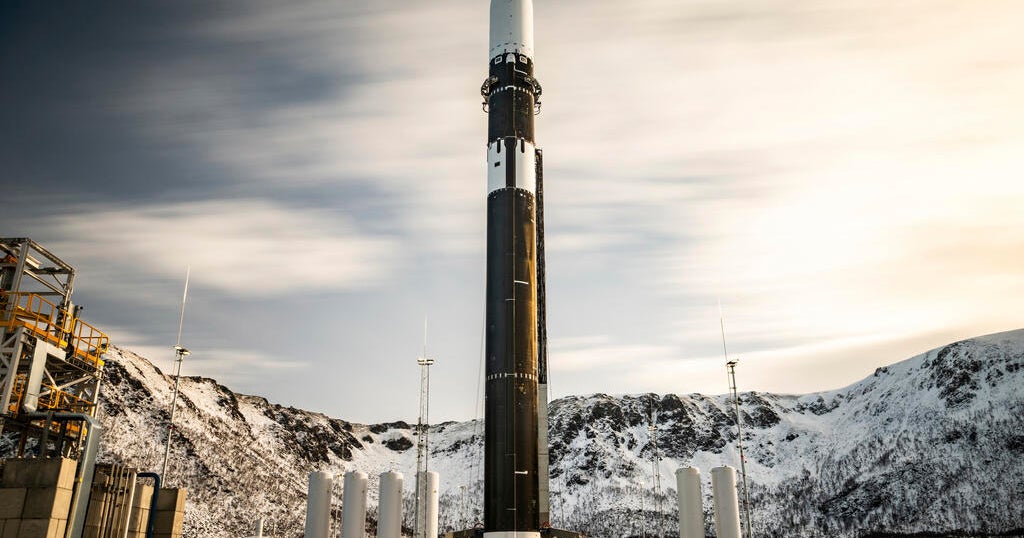On Sunday, a historic moment unfolded in Europe’s space exploration narrative as the Spectrum rocket, developed by German start-up Isar Aerospace, launched from Norway’s Andoya Spaceport. Although the unmanned rocket crashed about 40 seconds after liftoff, the company declared the test flight a success, marking it as Europe’s first privately funded orbital launch attempt since Russia. Despite not achieving orbit, the flight provided crucial data and validation for future launches.
| Article Subheadings |
|---|
| 1) Overview of the Launch |
| 2) Significance of the Spectrum Rocket |
| 3) Challenges Faced During Development |
| 4) Response from Isar Aerospace |
| 5) Future Implications for European Spaceflight |
Overview of the Launch
On March 21, 2025, the Spectrum rocket lifted off from the Andoya Spaceport in the Arctic region of Norway. The launch was slightly delayed due to various weather conditions. Just 40 seconds into its flight, the rocket began to smoke and subsequently crashed back to Earth, resulting in a powerful explosion. Despite this dramatic outcome, Isar Aerospace considered the mission a success due to valuable data obtained during the brief flight.
The Spectrum is a two-stage orbital rocket designed to propel payloads, such as satellites, into space. The rocket stood at an impressive height of 92 feet and was part of a project meant to enhance Europe’s capabilities in space launches, traditionally dominated by government agencies. Although the flight ended prematurely, it was a significant step towards independent space launches from Europe.
Significance of the Spectrum Rocket
The launch of the Spectrum rocket represents a monumental step for European space initiatives, as it is the first orbital launch from the European continent not including Russia, and notably financed almost entirely through private investment. This shift towards privatization underscores a broader trend where private enterprises are playing an increasingly significant role in space exploration.
The historical importance of this flight extends beyond just the technical achievements; it symbolizes a renewed effort for Europe to establish a more substantial foothold in the commercial space sector. By fostering a competitive environment, companies like Isar Aerospace are paving the way for future innovations and potential successful missions, which may be preceded by further experimental flights.
Challenges Faced During Development
The development of the Spectrum rocket did not come without its challenges. Multiple delays had been reported prior to the launch, largely attributed to unsavory weather conditions. The complex nature of aerospace engineering also means that many unforeseen issues can arise, leading teams to adapt and navigate around obstacles effectively.
Isar Aerospace had lowered expectations heading into the launch. Prior to liftoff, reports indicated that executives from the company had anticipated a very minimal flight success, stating that collecting data and testing the rocket systems were primary goals. They planned to leverage test flights to gradually enhance their systems and bring them closer to full operational readiness.
Response from Isar Aerospace
In a statement following the launch, Daniel Metzler, the CEO and co-founder of Isar Aerospace, expressed pride in the accomplishments of the flight despite the crash. He highlighted the clean liftoff and the substantial data gathered during the flight, confirming that the launch pad remained intact after the explosion. According to him, “Our first test flight met all our expectations, achieving a great success.”
The response from the company reflects a growing culture of resilience and learning in the aerospace sector, where every launch provides critical insights that can inform future missions. As they aim for subsequent launches, Isar Aerospace hopes to incorporate the lessons learned from this test flight to enhance their performance in the future.
Future Implications for European Spaceflight
The successful completion of the Spectrum’s flight means a new chapter for Europe, where private sector involvement is likely to flourish. Traditionally, the European Space Agency (ESA) has been the primary player in space launches, relying heavily on government funding and resources.
As initiatives like Isar Aerospace continue to gain momentum, there will likely be a paradigm shift in how space missions are conducted in Europe. This can lead to increased investment in satellite technology and various space-related ventures. Furthermore, the evolution of private orbital launches could significantly reduce dependence on traditional government-led initiatives, allowing a more vibrant and exploratory commercial space environment.
| No. | Key Points |
|---|---|
| 1 | The Spectrum rocket experienced a successful launch but crashed after 40 seconds. |
| 2 | This launch marks Europe’s first privately funded orbital endeavor, excluding Russia. |
| 3 | The test provided valuable data and validated multiple systems crucial for future launches. |
| 4 | Isar Aerospace’s leadership noted the importance of learning from test flights. |
| 5 | Future European space missions are likely to involve more private sector participation. |
Summary
The Spectrum rocket launch from Norway represents a historic milestone for European space initiatives, particularly in its shift toward private sector involvement. Although the launch did not culminate in an orbit, it provided essential insights and data that are expected to benefit future projects. The spirit of innovation and resilience showcased by Isar Aerospace highlights a promising future for commercial spaceflight in Europe.
Frequently Asked Questions
Question: What was the outcome of the Spectrum rocket launch?
The Spectrum rocket launched successfully but crashed 40 seconds into the flight. Despite this, Isar Aerospace labeled the test a success, gaining critical data from the experience.
Question: What does the Spectrum rocket aim to achieve?
The Spectrum rocket is designed to deliver payloads, such as satellites, into Earth’s orbit, enhancing Europe’s capabilities in space exploration.
Question: Who is Isar Aerospace?
Isar Aerospace is a German start-up focused on developing orbital rockets and aims to facilitate satellite launches predominantly through private investment.


